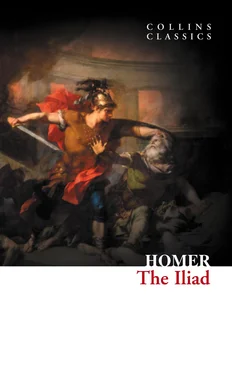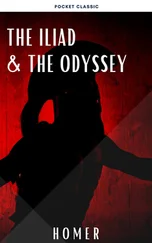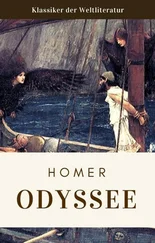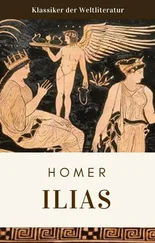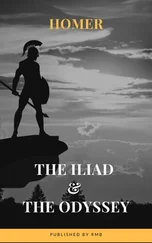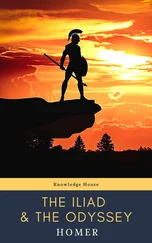The sacred counsels of almighty mind:
Involved in darkness likes the great decree,
Nor can the depths of fate be pierced by thee.
What fits thy knowledge, thou the first shalt know;
The first of gods above, and men below;
But thou, nor they, shall search the thoughts that roll
Deep in the close recesses of my soul.”
Full on the sire the goddess of the skies
Roll’d the large orbs of her majestic eyes,
And thus return’d:—“Austere Saturnius, say,
From whence this wrath, or who controls thy sway?
Thy boundless will, for me, remains in force,
And all thy counsels take the destined course.
But ’tis for Greece I fear: for late was seen,
In close consult, the silver-footed queen.
Jove to his Thetis nothing could deny,
Nor was the signal vain that shook the sky.
What fatal favour has the goddess won,
To grace her fierce, inexorable son?
Perhaps in Grecian blood to drench the plain,
And glut his vengeance with my people slain.”
Then thus the god: “O restless fate of pride,
That strives to learn what heaven resolves to hide;
Vain is the search, presumptuous and abhorr’d,
Anxious to thee, and odious to thy lord.
Let this suffice: the immutable decree
No force can shake: what is, that ought to be.
Goddess, submit; nor dare our will withstand,
But dread the power of this avenging hand:
The united strength of all the gods above
In vain resists the omnipotence of Jove.”
The thunderer spoke, nor durst the queen reply;
A reverent horror silenced all the sky.
The feast disturb’d, with sorrow Vulcan saw
His mother menaced, and the gods in awe;
Peace at his heart, and pleasure his design,
Thus interposed the architect divine:
“The wretched quarrels of the mortal state
Are far unworthy, gods! of your debate:
Let men their days in senseless strife employ,
We, in eternal peace and constant joy.
Thou, goddess-mother, with our sire comply,
Nor break the sacred union of the sky:
Lest, roused to rage, he shake the bless’d abodes,
Launch the red lightning, and dethrone the gods.
If you submit, the thunderer stands appeased;
The gracious power is willing to be pleased.”
Thus Vulcan spoke: and rising with a bound,
The double bowl with sparkling nectar crown’d,
Which held to Juno in a cheerful way,
“Goddess (he cried), be patient and obey.
Dear as you are, if Jove his arm extend,
I can but grieve, unable to defend
What god so daring in your aid to move,
Or lift his hand against the force of Jove?
Once in your cause I felt his matchless might,
Hurl’d headlong down from the ethereal height;
Toss’d all the day in rapid circles round,
Nor till the sun descended touch’d the ground.
Breathless I fell, in giddy motion lost;
The Sinthians raised me on the Lemnian coast;
He said, and to her hands the goblet heaved,
Which, with a smile, the white-arm’d queen received
Then, to the rest he fill’d; and in his turn,
Each to his lips applied the nectar’d urn,
Vulcan with awkward grace his office plies,
And unextinguish’d laughter shakes the skies.
Thus the blest gods the genial day prolong,
In feasts ambrosial, and celestial song.
Apollo tuned the lyre; the Muses round
With voice alternate aid the silver sound.
Meantime the radiant sun to mortal sight
Descending swift, roll’d down the rapid light:
Then to their starry domes the gods depart,
The shining monuments of Vulcan’s art:
Jove on his couch reclined his awful head,
And Juno slumber’d on the golden bed.
Argument
The Trial of the Army, and Catalogue
of the Forces
Jupiter, in pursuance of the request of Thetis, sends a deceitful vision to Agamemnon, persuading him to lead the army to battle, in order to make the Greeks sensible of their want of Achilles. The general, who is deluded with the hopes of taking Troy without his assistance, but fears the army was discouraged by his absence, and the late plague, as well as by the length of time, contrives to make trial of their disposition by a stratagem. He first communicates his design to the princes in council, that he would propose a return to the soldiers, and that they should put a stop to them if the proposal was embraced. Then he assembles the whole host, and upon moving for a return to Greece, they unanimously agree to it, and run to prepare the ships. They are detained by the management of Ulysses, who chastises the insolence of Thersites. The assembly is recalled, several speeches made on the occasion, and at length the advice of Nestor followed, which was to make a general muster of the troops, and to divide them into their several nations, before they proceeded to battle. This gives occasion to the poet to enumerate all the forces of the Greeks and Trojans, and in a large catalogue.
The time employed in this book consists not entirely of one day. The scene lies in the Grecian camp, and upon the sea-shore; towards the end it removes to Troy.
Now pleasing sleep had seal’d each mortal eye,
Stretch’d in the tents the Grecian leaders lie:
The immortals slumber’d on their thrones above;
All, but the ever-wakeful eyes of Jove.
To honour Thetis’ son he bends his care,
And plunge the Greeks in all the woes of war:
Then bids an empty phantom rise to sight,
And thus commands the vision of the night.
“Fly hence, deluding Dream! and light as air,
To Agamemnon’s ample tent repair.
Bid him in arms draw forth the embattled train,
Lead all his Grecians to the dusty plain.
Declare, e’en now ’tis given him to destroy
The lofty towers of wide-extended Troy.
For now no more the gods with fate contend,
At Juno’s suit the heavenly factions end.
Destruction hangs o’er yon devoted wall,
And nodding Ilion waits the impending fall.”
Swift as the word the vain illusion fled,
Descends, and hovers o’er Atrides’ head;
Clothed in the figure of the Pylian sage,
Renown’d for wisdom, and revered for age:
Around his temples spreads his golden wing,
And thus the flattering dream deceives the king.
“Canst thou, with all a monarch’s cares oppress’d,
O Atreus’ son! canst thou indulge the rest?
Ill fits a chief who mighty nations guides,
Directs in council, and in war presides,
To whom its safety a whole people owes,
To waste long nights in indolent repose.
Monarch, awake! ’tis Jove’s command I bear;
Thou, and thy glory, claim his heavenly care.
In just array draw forth the embattled train,
Lead all thy Grecians to the dusty plain;
E’en now, O king! ’tis given thee to destroy
The lofty towers of wide-extended Troy.
For now no more the gods with fate contend,
At Juno’s suit the heavenly factions end.
Destruction hangs o’er yon devoted wall,
And nodding Ilion waits the impending fall.
Awake, but waking this advice approve,
And trust the vision that descends from Jove.”
The phantom said; then vanish’d from his sight,
Resolves to air, and mixes with the night.
A thousand schemes the monarch’s mind employ;
Elate in thought he sacks untaken Troy:
Vain as he was, and to the future blind,
Nor saw what Jove and secret fate design’d,
What mighty toils to either host remain,
What scenes of grief, and numbers of the slain!
Eager he rises, and in fancy hears
The voice celestial murmuring in his ears.
First on his limbs a slender vest he drew,
Читать дальше
